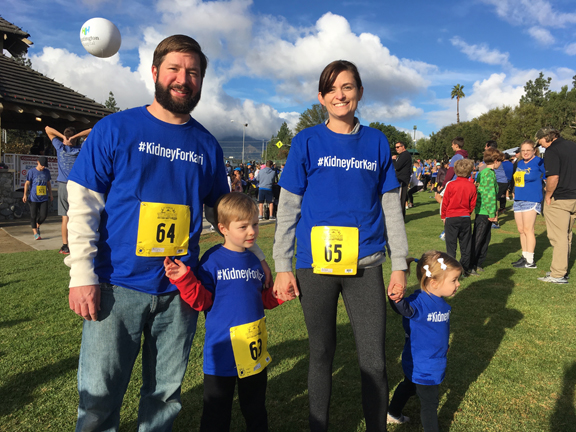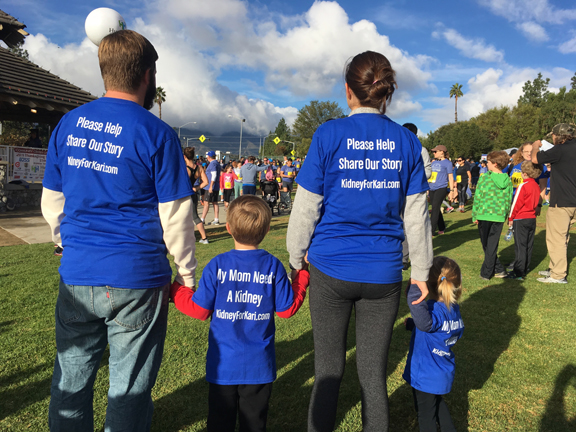As her disease progresses, a local mom is dedicated to finding a new kidney to halt her PKD.

At the 2018 Thanksgiving Day Run & Food Drive, local resident Kari Carson and her family – husband Jason, son Finn, 5, and daughter Tess, 2 – wore T-shirts letting the community know she is looking for a kidney donor.
By Mary O’KEEFE
Kari Carson doesn’t look sick. She is a busy Realtor and mother, and even ran the Thanksgiving Day Run & Food Drive in La Cañada. But looks can be deceiving. Carson is suffering from a genetic disease that is destroying her kidneys and jeopardizing her life.
Carson, who is 39 years old, has polycystic kidney disease (PKD), a genetic chronic disease that causes cysts to grow in the kidneys. This will eventually lead to renal failure. The aggressiveness of the disease varies from person-to-person and there is no cure and few options.
PKD is a disease that can cause severe pain. The number of cysts multiplies as the disease progresses, adding weight to the kidney. The average size of a human kidney, according to the National Kidney Foundation, is about five inches. With PKD the kidney grows with the cysts and can weigh up to 30 pounds.
“My grandmother, father, cousin and sister all have [PKD],” Carson said.
The disease has affected each of her family members at a different rate and intensity. For Carson, the disease is progressing quickly; her sister’s PKD is not as intense.
“I got a kidney infection and they found that I was developing cysts all over my kidneys,” she said. “This is a degenerative disease and the more cysts I have the larger my kidneys grow.”
The pain from the disease is increasing but she is still able to work, though it takes its toll.
“I am really tired all the time,” she said.
Her husband Jason is a great support source, taking care of their two young children Finn and Tess.
“You can slowly lose the function of your kidneys, but I am on the fast-track like my father, who lost function at age 40,” she said. “Others don’t lose function until they are in their 60s.”
As the kidneys grow the disease can cause issues with other organs; it can affect blood pressure, which leads to more health issues. Carson’s father, who has been on dialysis for 30 years, had an aneurysm and stroke – both are symptoms of the disease.
Even though the cysts on her kidneys are growing, Carson is still able to live her life. However, doctors have told her to be prepared to go on kidney dialysis unless she can find a transplant donor.
“I am on the transplant list through the National UNOS [United Network for Organ Sharing] list, but doctors have told me that could take seven to eight years [for a donor to be found],” Carson said.
According to the National Kidney Foundation, 3,000 new patients in 2016 were added each month to the kidney waiting list; that is one patient every 14 minutes.
Carson’s best option, according to her doctors, is to find a live donor – someone willing to donate one of their healthy kidneys. Humans can live a normal life with one healthy kidney.
In 2014, according to the National Kidney Foundation, there were 5,538 living donors. Carson has reached out to friends and family members not affected with PKD but she has not found a match. The family members who are healthy enough to donate have already donated and even one of her friends donated prior to knowing Carson had PKD.
So she is now reaching out to find a living donor. She has created a website, www.kidneyforkari.com, to share her story.
“There is a link on the website to UCLA for an online confidential questionnaire for those [interested in donating] to fill out,” she said.
The program has privacy protections for the donor. Carson will not know how many have offered to donate, their background or if they have been tested.
“I can know nothing about the process; it is all confidential. We have no idea how many or who has offered [to donate] until we find a match,” she said. “And even then [prospective donors] can change their minds at any point through the process and we still wouldn’t know who it was.”
She said she also has no idea who would be compatible for the transplant.
“It is a numbers game,” Carson said. “You have to have a lot of people to find a healthy donor.”
She has developed her website to help in the search for a kidney and to share information on PKD. She knows the disease is not going away. She has watched her father and other family members struggle with PKD and knows what the future holds for her, which is why she is willing to take this very private struggle public – in the hope that someone, somewhere would be a living donor. Carson said she understands it is a lot to ask, but after talking to doctors she has been told there are people who are willing to be donors.
In the meantime, she is keeping a positive attitude even as the disease progresses.
“My biggest fear is that my young children might have to grow up without their mom,” she said.
For more information, visit www.kidneyforkari.com.

